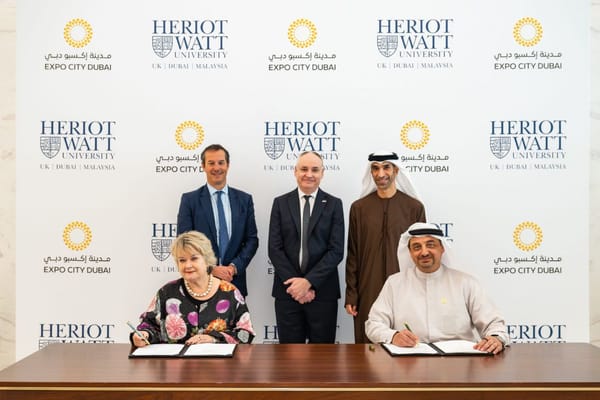Imagine walking into your office, greeted by wellness posters, a meditation room, and occasional yoga sessions—all under the banner of “employee happiness.” But as you settle into your desk, the reality hits: overwhelming workloads, unrealistic deadlines, and a culture that prioritizes output over mental well-being. Does this sound familiar?
In recent years, the UAE has seen a major corporate shift toward prioritizing employee well-being. Organizations are rolling out mental health programs, flexible work policies, and wellness benefits, all aimed at improving workplace satisfaction.
According to a recent survey, 94% of UAE companies report that well-being programs positively impact employee performance and productivity, and 88% of employers plan to increase their investment in employee well-being in the coming year. This move aligns with the UAE’s broader vision for a competitive, sustainable workforce.
On the surface, these numbers suggest a progressive shift in workplace culture. Yet, beneath the glossy wellness campaigns, many employees continue to face high stress levels, extended work hours, and increasing burnout. Despite companies touting work-life balance initiatives, the UAE still ranks among the top countries for longest average working hours globally, with employees clocking an average of 50.9 hours per week—raising the question: Are these well-being programs truly transformative, or are they just a corporate façade?
As the conversation around employee happiness gains momentum, it's essential to separate meaningful action from superficial corporate branding. Are these initiatives truly addressing the root causes of workplace dissatisfaction, or are they simply designed to meet HR benchmarks?
In this article, we’ll dive into the reality of corporate well-being efforts in the UAE, analyzing whether companies are genuinely committed to fostering a happier workforce or merely ticking the boxes of modern workplace trends.
The Business Case for Employee Happiness in the UAE
In the dynamic corporate landscape of the United Arab Emirates (UAE), the well-being of employees has emerged as a pivotal factor influencing organizational success. A substantial body of research underscores the direct correlation between employee happiness and enhanced performance metrics.
Positive Impact on Performance and Productivity
Recent surveys reveal that a remarkable 94% of UAE companies have observed a positive impact on performance and productivity following the implementation of well-being programs. These initiatives encompass a range of strategies, from mental health support and stress management workshops to flexible working arrangements, all designed to foster a supportive work environment. The tangible benefits are evident: over half of the senior leaders reported significant improvements in productivity, with 49% noting heightened employee engagement and 36% experiencing reduced absenteeism.
Return on Well-being Investment (ROWI)
The financial rationale for investing in employee well-being is compelling. A notable 88% of UAE employers plan to increase their investment in well-being programs in the coming year, driven by a clear Return on Well-being Investment (ROWI). This strategic allocation of resources not only enhances employee morale but also contributes to the organization's bottom line. For instance, organizations with robust wellness programs have reported a 6-to-1 return on investment, attributed to improved employee engagement and reduced healthcare costs.
Enhanced Employee Satisfaction and Retention
Employee well-being programs significantly influence job satisfaction and retention rates. Surveys indicate that 66% of employees express contentment with their company's wellness offerings, which include flexible work policies, health workshops, and parental leave programs. These initiatives have led to improved work-life balance for over 60% of employees, with nearly half reporting better overall health. Such positive outcomes not only enhance the employee experience but also position companies as attractive employers in a competitive market.
Economic Implications
The broader economic impact of prioritizing employee happiness is noteworthy. Disengaged employees are estimated to cost the UAE economy up to $10.3 billion annually due to lost productivity. Conversely, companies that proactively invest in well-being programs not only mitigate these losses but also contribute to a more robust and resilient economy.
The State of Employee Satisfaction in the UAE

Employee well-being has become a central focus in the UAE, with both public and private sectors actively investing in workplace happiness initiatives. The country has established itself as a leader in fostering a positive work environment, with government-led efforts setting a benchmark for private companies to follow.
Public Sector: Setting High Standards for Workplace Happiness
Dubai’s government entities have consistently achieved high employee satisfaction ratings, reflecting their strong commitment to well-being. In 2024, the average employee happiness rating across government organizations reached 86.7%, showcasing a structured and well-implemented approach to workplace satisfaction.
Several key departments have led the way:
- Mohammed Bin Rashid Housing Establishment (MBRHE) – 96.7% employee happiness
- Awqaf Dubai – 96.2% employee happiness
- General Directorate of Residency and Foreigners Affairs – Dubai (GDRFAD) – 95.3% employee happiness
- Dubai Municipality, DEWA, Dubai Police, and Dubai Sports Council – All reported employee happiness scores exceeding 90%
These government organizations have successfully implemented well-being initiatives through structured policies, feedback-driven improvements, and workplace programs designed to enhance employee engagement. Dubai's leadership continues to promote employee-centric approaches, with a focus on data-driven insights to ensure sustainable workplace satisfaction.
Private Sector: Growing Investments in Workplace Well-Being
The UAE’s private sector has also embraced workplace happiness, recognizing the benefits of employee satisfaction in driving business performance. A recent survey found that 88% of UAE companies plan to increase their investment in well-being programs, signaling a strong commitment to fostering healthier and more engaging workplaces. Companies are actively implementing initiatives such as:
- Mental health support programs
- Flexible work policies
- Wellness and fitness initiatives
- Enhanced parental leave benefits
In addition, 84% of employees in the UAE and Saudi Arabia report feeling proud of their work and their companies, indicating a strong cultural alignment between businesses and their workforce. Employees have reported positive changes, with:
- 60% experiencing better work-life balance
- 47% noting improvements in their overall health
- 41% feel more motivated at work
- 36% reporting reduced stress levels
The UAE's corporate wellness market is projected to grow at a CAGR of 4.98%, reaching approximately US$229.883 million by 2030. This expansion reflects the increasing prioritization of workplace well-being as a fundamental part of corporate strategy.
Evaluating Corporate Well-Being Initiatives in the UAE

In the United Arab Emirates (UAE), corporate well-being programs have become integral to organizational strategies, aiming to enhance employee satisfaction and productivity. While these initiatives have yielded positive outcomes, challenges persist, particularly concerning work-life balance.
Positive Outcomes of Well-Being Programs
Many UAE companies have recognized the benefits of investing in employee well-being. Implementing programs such as flexible working hours, health and wellness workshops, and mental health support has led to:
- Improved Work-Life Balance: Over 60% of employees reported that well-being initiatives have significantly enhanced their work-life balance.
- Increased Motivation: Approximately 41% of employees experienced heightened motivation levels.
- Reduced Stress Levels: Around 36% of employees noted a decrease in stress due to these programs.
These findings highlight the tangible benefits of well-being programs in fostering a more engaged and productive workforce.
Challenges Faced by Employees in the UAE
The United Arab Emirates (UAE) is renowned for its rapid economic growth and diverse expatriate workforce. However, employees in the UAE encounter several challenges that impact their work experience and overall well-being.
Extended Working Hours
Employees in the UAE often face long working hours, with the country ranking among the top globally for the highest average weekly working hours at 50.9 hours. This demanding work culture can lead to burnout and adversely affect work-life balance.
High Cost of Living and Financial Pressures
The rising cost of living in the UAE has become a significant concern for employees. Increased expenses, coupled with salary pressures, have led to financial stress among workers. A recent survey indicates that 65% of professionals are considering job changes before the end of 2025, primarily due to financial concerns.
Work-Life Balance and Leave Policies
Achieving a satisfactory work-life balance remains a challenge for many employees. While UAE labor laws entitle workers to 30 days of paid annual leave, some companies impose restrictions on when leave can be taken, limiting flexibility and potentially leading to increased stress.
Health and Safety Concerns
Despite regulations, some workers, particularly in construction and outdoor sectors, face inadequate health and safety measures. Exposure to extreme heat without sufficient rest or hydration has led to serious health issues among laborers.
Economic Implications of Employee Disengagement
Employee disengagement presents a significant economic challenge in the UAE. Studies estimate that disengaged employees cost the UAE economy up to $10.3 billion annually in lost productivity. This substantial financial burden underscores the necessity for companies to move beyond superficial wellness initiatives and adopt comprehensive strategies that genuinely enhance job satisfaction and employee engagement.
The Disconnect Between Policy and Practice

n the evolving landscape of workplace dynamics, a notable disparity often exists between corporate policies and their practical impact on employee satisfaction. This disconnect is particularly evident in areas such as return-to-office (RTO) mandates and leadership trust, where well-intentioned policies may inadvertently undermine employee engagement and retention.
Return-to-Office Mandates and Employee Engagement
Many organizations have implemented RTO mandates with the objective of enhancing collaboration and productivity. However, recent studies suggest that these mandates may not achieve the desired outcomes and could, in fact, diminish employee engagement.
- Impact on Engagement: Research indicates that employees compelled to return to the office are more likely to disengage from their work. A survey revealed that those required to work on-site were 14 times more likely to "quiet quit" compared to their counterparts with flexible work options. This disengagement manifests as reduced enthusiasm and commitment, adversely affecting overall productivity.
- Attrition Rates: The enforcement of strict in-office policies has been linked to increased employee turnover. Approximately 42% of companies that mandated a return to the office reported higher-than-expected attrition levels. This trend suggests that inflexible work arrangements may prompt employees to seek opportunities elsewhere, where flexibility is prioritized.
- Talent Retention Challenges: Rigid RTO policies can deter potential talent and lead to the loss of existing high-performing employees. Notably, 8 in 10 employers experienced talent losses attributed to the imposition of return-to-office mandates, underscoring the importance of adaptable work environments in retaining skilled professionals.
Leadership Trust and Turnover Intentions
Employee perceptions of leadership play a crucial role in shaping organizational commitment and turnover intentions. A disconnect between leadership policies and employee expectations can erode trust, leading to increased turnover.
- Low Confidence in Leadership: Studies have found that a significant percentage of employees harbor doubts about their organization's leadership. For instance, a survey revealed that only 26% of employees expressed trust in their senior leaders, indicating a pervasive lack of confidence that can impact morale and retention.
- Turnover Intentions: The absence of authentic leadership and perceived supervisor support has been linked to higher turnover intentions. Employees who lack trust in their leaders are more inclined to consider leaving the organization, highlighting the need for leadership practices that foster trust and transparency.
The misalignment between corporate policies and employee expectations can have profound implications for engagement and retention. Organizations aiming to enhance employee satisfaction should critically assess the practical impacts of their policies, ensuring they align with the evolving needs and preferences of their workforce.
By fostering flexible work arrangements and cultivating trustworthy leadership, companies can bridge the gap between policy and practice, leading to a more committed and contented workforce.
Recommendations for Genuine Investment in Employee Happiness

For organizations in the UAE to truly invest in employee happiness, a shift beyond surface-level initiatives is necessary. While many companies implement wellness programs, their effectiveness depends on how deeply they address employees' actual needs. Comprehensive well-being strategies that focus on mental health, work-life balance, respect, professional growth, and communication can foster a healthier and more engaged workforce.
One of the most critical aspects of employee well-being is mental health. Stress and burnout remain significant challenges, with long working hours and high-performance expectations taking a toll on employees. Companies should prioritize structured mental health programs, such as Employee Assistance Programs (EAPs), confidential counseling services, and regular mental health workshops. Encouraging open conversations about mental health within the workplace is equally important, as stigma often prevents employees from seeking help. Studies show that every dollar invested in mental health initiatives can yield a return of $4 in improved productivity and reduced absenteeism, making it a financially sound decision as well.
Beyond mental health, creating a culture of recognition and respect plays a crucial role in employee satisfaction. Employees who feel valued are more likely to stay engaged and committed to their roles. Organizations should implement formal and informal recognition programs, celebrating both major achievements and everyday contributions. Peer recognition, where employees acknowledge each other’s efforts, also helps cultivate a positive and supportive work environment. Research indicates that companies with strong recognition cultures experience significantly lower turnover rates, as employees are more likely to feel appreciated and motivated.
Flexibility in work arrangements has become a key factor in employee well-being. Despite well-being initiatives, the UAE still ranks among the top countries for longest working hours, averaging 50.9 hours per week. To counteract this, companies should adopt flexible work policies, allowing employees to have better control over their schedules. Hybrid work models, remote work options, and compressed workweeks can contribute to improved work-life balance. Organizations that have embraced flexible work arrangements report higher productivity levels and greater employee satisfaction.
Professional development opportunities also play a crucial role in fostering a sense of purpose and job satisfaction. Employees are more likely to stay with companies that invest in their growth through training programs, mentorship, and financial support for further education. Career stagnation often leads to disengagement, whereas clear development pathways increase motivation and loyalty. By providing learning opportunities, companies not only upskill their workforce but also strengthen their internal talent pipeline, reducing the need for external hiring.
Effective communication within organizations is another critical factor in employee happiness. A workplace where employees feel heard and included in decision-making fosters trust and engagement. Regular meetings, open feedback channels, and clear communication about company policies and goals ensure that employees feel informed and valued. Leadership transparency, particularly in decision-making, is essential in building an environment where employees feel secure and motivated.
Ultimately, genuine investment in employee well-being goes beyond implementing a few wellness programs. It requires a cultural shift where companies prioritize their workforce’s holistic well-being—physically, mentally, and professionally. By addressing key concerns such as mental health, recognition, flexibility, career growth, and communication, businesses in the UAE can create environments where employees feel genuinely supported, leading to a more engaged, productive, and loyal workforce.
The push for employee well-being in the UAE has never been stronger. Organizations are introducing wellness programs, mental health initiatives, and flexible work arrangements—yet the real question remains: Are these efforts truly improving the employee experience, or are they just corporate checkboxes? A company’s well-being strategy is only as effective as its ability to listen to, understand, and act on the actual needs of its workforce.
Superficial measures can no longer sustain a modern, engaged workforce. Offering meditation apps while employees struggle with excessive workloads, or organizing team-building events while disregarding workplace stressors, only widens the gap between corporate intent and employee reality. True investment in workplace happiness requires organizations to address systemic issues—long working hours, rigid policies, lack of growth opportunities—and replace them with sustainable, employee-centered practices.
Genuine commitment to employee well-being isn’t just about making the workplace more comfortable; it’s about recognizing that happy employees are the backbone of any successful organization. Research consistently shows that workplaces prioritizing employee happiness experience higher retention rates, increased productivity, and stronger financial performance. A company that truly values its employees will not only gain their loyalty but will cultivate an environment where innovation, collaboration, and success thrive.
Employees deserve to work in environments where their contributions are valued, their mental well-being is safeguarded, and their growth is actively supported. The future of work in the UAE depends on companies making the conscious decision to go beyond surface-level perks and build workplaces where employees don’t just survive but truly flourish.
Also Read:

















